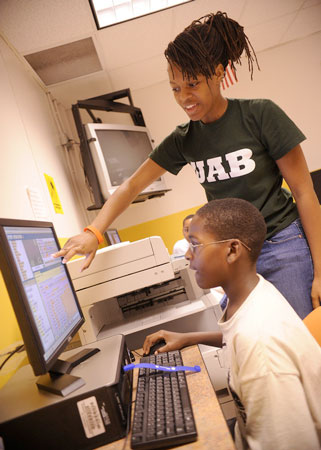Written by: Tiffany Westry
Need more info? Contact us
 UAB students helps young boy during a Center for Community Outreach Development (CORD) Middle School Summer Science Camp.The University of Alabama at Birmingham Center for Community OutReach Development has been awarded $1.45 million in funding from the National Science Foundation to increase the number of science, technology, engineering and math teachers in high-need areas of the state.
UAB students helps young boy during a Center for Community Outreach Development (CORD) Middle School Summer Science Camp.The University of Alabama at Birmingham Center for Community OutReach Development has been awarded $1.45 million in funding from the National Science Foundation to increase the number of science, technology, engineering and math teachers in high-need areas of the state.
The project will investigate the usefulness and success of three different models for preparing teachers in STEM fields. “Model 1” engages UAB first- and second-year undergraduate students in STEM fields, along with providing scholarships for UAB junior and senior undergraduates majoring in these areas. “Model 2” focuses on engaging third- and fourth-year UAB undergraduate STEM students, leading them to a fifth-year teacher education program. The final stage, “Model 3,” is a one-year program that will engage career-changers who already have a STEM bachelor’s degree. The project aims to increase the number of STEM secondary teachers in Alabama and build a new student pipeline to secondary education STEM careers.
“The K-12 STEM teaching needs in the state of Alabama are well-documented,” said Robert Palazzo, Ph.D., dean of the UAB College of Arts and Sciences. “CORD is part of UAB’s answer to solving these problems. Dr. Michael Wyss has been committed to improving STEM education in Alabama for more than two decades, working tirelessly since the launch of CORD in 1998. This NSF grant is yet another example of his commitment, the commitment of the College of Arts and Sciences, the School of Education, and the UAB administration to address the academic needs of Alabama’s children directly. We will not cease these efforts until the state of Alabama is recognized as a premier STEM education state.”
The project will include UABTeach, a program that facilitates undergraduate students with STEM majors to simultaneously receive both a degree in their declared major and a full teaching certification to teach at the middle and high school levels in just four years, and a partnership with Lawson State Community College.
“The attrition rate for STEM teachers in middle and high schools throughout the United States, including Alabama, is high, due teachers’ being faced with other lucrative career choices, relatively high educational debt compared to their salaries and a lack of strong support in the initial years of teaching,” said Wyss, principal investigator and UAB CORD director. “The Collaboration for Excellence in Science and Math Education II program addresses these challenges by funding much of the students’ education and strongly supporting the students in their training and initial years of teaching.”
| "We need to develop more teachers who are highly trained in STEM areas and are passionate about them to guide students through complex, and rapidly advancing STEM topics and activities. Also, there is a marked lack of STEM teachers of color in Alabama schools, thus diminishing role models who can help minority students understand that they too can succeed in STEM careers.” |
Over five years, CESAME II will develop 65 to 75 highly trained STEM majors who will go on to teach in high-needs school districts throughout Alabama. STEM post-baccalaureate students will receive Noyce scholarships to become STEM teachers. Support for all scholars will continue through the graduates’ first years in teaching in high-needs schools. The project will also introduce community college students to STEM teaching careers. The program will provide developmental support for community college students through a program of academic and practical experiences that lead to STEM teacher certification through either a Bachelor of Science degree or a master’s degree with certification in secondary STEM education.
The program will aggressively recruit students who are currently underrepresented in secondary STEM education. After completing the program, graduates will be supported via classroom visits, professional learning communities, UAB faculty support and resources via many Center for OutReach Development programs for secondary STEM education. The project goal is to create a cadre of excellent teachers who will remain in secondary STEM education and be committed to teaching in high-needs schools throughout Alabama and to add to the knowledge base of which programs are successful.
“The challenges in STEM education are especially acute for minority and disadvantaged children both in Alabama and around the U.S.,” Wyss said. “For them, the great lack of significant early STEM education contributes to the continuation of economic and health disparities. We need to develop more teachers who are highly trained in STEM areas and are passionate about them to guide students through complex, and rapidly advancing STEM topics and activities. Also, there is a marked lack of STEM teachers of color in Alabama schools, thus diminishing role models who can help minority students understand that they too can succeed in STEM careers.”
The Center for Community OutReach Development, housed in the UAB College of Arts and Sciences, was established in 1998 to advance UAB’s outreach efforts in the Birmingham community. CORD has expanded its primary focus to advancing K-12 science education throughout the state and nation. The center develops programs to improve the regional, racial and gender disparities in science, math and engineering. CORD offers hands-on, inquiry-based science experiences both during the school year and in more intensive summer programs. Students experience these programs at Birmingham-area schools, at CORD’s GENEius and LabWorks classrooms at the McWane Science Center, and in CORD’s laboratory classrooms at UAB. For more information about these programs, visit the UAB CORD website.